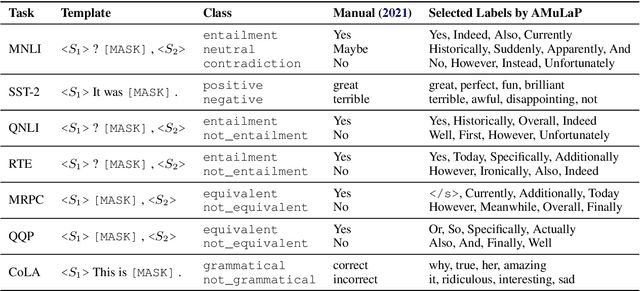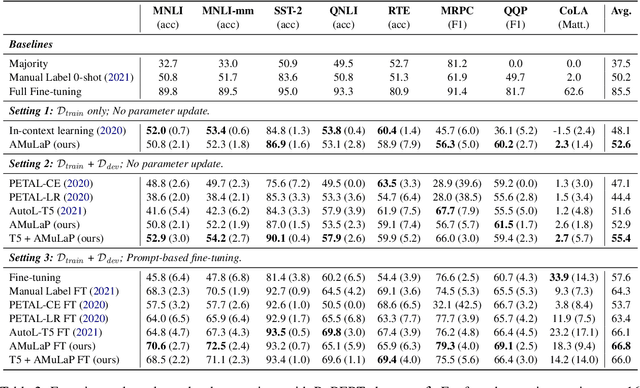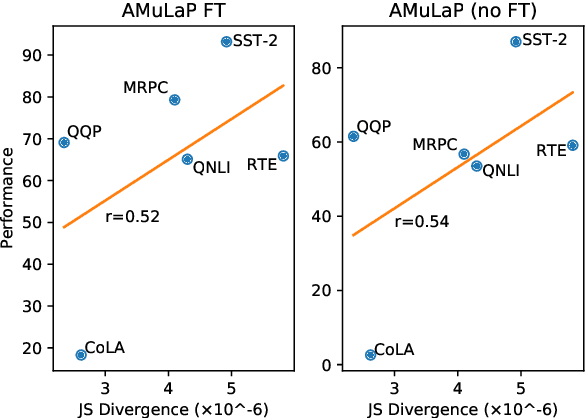Canwen Xu
ExCoT: Optimizing Reasoning for Text-to-SQL with Execution Feedback
Mar 25, 2025Abstract:Text-to-SQL demands precise reasoning to convert natural language questions into structured queries. While large language models (LLMs) excel in many reasoning tasks, their ability to leverage Chain-of-Thought (CoT) reasoning for text-to-SQL remains underexplored. We identify critical limitations: zero-shot CoT offers minimal gains, and Direct Preference Optimization (DPO) applied without CoT yields marginal improvements. We propose ExCoT, a novel framework that iteratively optimizes open-source LLMs by combining CoT reasoning with off-policy and on-policy DPO, relying solely on execution accuracy as feedback. This approach eliminates the need for reward models or human-annotated preferences. Our experimental results demonstrate significant performance gains: ExCoT improves execution accuracy on BIRD dev set from 57.37% to 68.51% and on Spider test set from 78.81% to 86.59% for LLaMA-3 70B, with Qwen-2.5-Coder demonstrating similar improvements. Our best model achieves state-of-the-art performance in the single-model setting on both BIRD and Spider datasets, notably achieving 68.53% on the BIRD test set.
StarCoder 2 and The Stack v2: The Next Generation
Feb 29, 2024



Abstract:The BigCode project, an open-scientific collaboration focused on the responsible development of Large Language Models for Code (Code LLMs), introduces StarCoder2. In partnership with Software Heritage (SWH), we build The Stack v2 on top of the digital commons of their source code archive. Alongside the SWH repositories spanning 619 programming languages, we carefully select other high-quality data sources, such as GitHub pull requests, Kaggle notebooks, and code documentation. This results in a training set that is 4x larger than the first StarCoder dataset. We train StarCoder2 models with 3B, 7B, and 15B parameters on 3.3 to 4.3 trillion tokens and thoroughly evaluate them on a comprehensive set of Code LLM benchmarks. We find that our small model, StarCoder2-3B, outperforms other Code LLMs of similar size on most benchmarks, and also outperforms StarCoderBase-15B. Our large model, StarCoder2- 15B, significantly outperforms other models of comparable size. In addition, it matches or outperforms CodeLlama-34B, a model more than twice its size. Although DeepSeekCoder- 33B is the best-performing model at code completion for high-resource languages, we find that StarCoder2-15B outperforms it on math and code reasoning benchmarks, as well as several low-resource languages. We make the model weights available under an OpenRAIL license and ensure full transparency regarding the training data by releasing the SoftWare Heritage persistent IDentifiers (SWHIDs) of the source code data.
Contrastive Post-training Large Language Models on Data Curriculum
Oct 03, 2023



Abstract:Alignment serves as an important step to steer large language models (LLMs) towards human preferences. In this paper, we explore contrastive post-training techniques for alignment by automatically constructing preference pairs from multiple models of varying strengths (e.g., InstructGPT, ChatGPT and GPT-4). We carefully compare the contrastive techniques of SLiC and DPO to SFT baselines and find that DPO provides a step-function improvement even after continueing SFT saturates. We also explore a data curriculum learning scheme for contrastive post-training, which starts by learning from "easier" pairs and transitioning to "harder" ones, which further improves alignment. Finally, we scale up our experiments to train with more data and larger models like Orca. Remarkably, contrastive post-training further improves the performance of Orca, already a state-of-the-art instruction learning model tuned with GPT-4 outputs, to exceed that of ChatGPT.
LongCoder: A Long-Range Pre-trained Language Model for Code Completion
Jun 26, 2023



Abstract:In this paper, we introduce a new task for code completion that focuses on handling long code input and propose a sparse Transformer model, called LongCoder, to address this task. LongCoder employs a sliding window mechanism for self-attention and introduces two types of globally accessible tokens - bridge tokens and memory tokens - to improve performance and efficiency. Bridge tokens are inserted throughout the input sequence to aggregate local information and facilitate global interaction, while memory tokens are included to highlight important statements that may be invoked later and need to be memorized, such as package imports and definitions of classes, functions, or structures. We conduct experiments on a newly constructed dataset that contains longer code context and the publicly available CodeXGLUE benchmark. Experimental results demonstrate that LongCoder achieves superior performance on code completion tasks compared to previous models while maintaining comparable efficiency in terms of computational resources during inference. All the codes and data are available at https://github.com/microsoft/CodeBERT.
RepoBench: Benchmarking Repository-Level Code Auto-Completion Systems
Jun 05, 2023



Abstract:Large Language Models (LLMs) have greatly advanced code auto-completion systems, with a potential for substantial productivity enhancements for developers. However, current benchmarks mainly focus on single-file tasks, leaving an assessment gap for more complex, real-world, multi-file programming scenarios. To fill this gap, we introduce RepoBench, a new benchmark specifically designed for evaluating repository-level code auto-completion systems. RepoBench consists of three interconnected evaluation tasks: RepoBench-R (Retrieval), RepoBench-C (Code Completion), and RepoBench-P (Pipeline). Each task respectively measures the system's ability to retrieve the most relevant code snippets from other files as cross-file context, predict the next line of code with cross-file and in-file context, and handle complex tasks that require a combination of both retrieval and next-line prediction. RepoBench aims to facilitate a more complete comparison of performance and encouraging continuous improvement in auto-completion systems. RepoBench is publicly available at https://github.com/Leolty/repobench.
Small Models are Valuable Plug-ins for Large Language Models
May 15, 2023Abstract:Large language models (LLMs) such as GPT-3 and GPT-4 are powerful but their weights are often publicly unavailable and their immense sizes make the models difficult to be tuned with common hardware. As a result, effectively tuning these models with large-scale supervised data can be challenging. As an alternative, In-Context Learning (ICL) can only use a small number of supervised examples due to context length limits. In this paper, we propose Super In-Context Learning (SuperICL) which allows black-box LLMs to work with locally fine-tuned smaller models, resulting in superior performance on supervised tasks. Our experiments demonstrate that SuperICL can improve performance beyond state-of-the-art fine-tuned models while addressing the instability problem of in-context learning. Furthermore, SuperICL can enhance the capabilities of smaller models, such as multilinguality and interpretability.
Baize: An Open-Source Chat Model with Parameter-Efficient Tuning on Self-Chat Data
Apr 04, 2023Abstract:Chat models, such as ChatGPT, have shown impressive capabilities and have been rapidly adopted across numerous domains. However, these models are only accessible through a restricted API, creating barriers for new research and progress in the field. We propose a pipeline that can automatically generate a high-quality multi-turn chat corpus by leveraging ChatGPT to engage in a conversation with itself. Subsequently, we employ parameter-efficient tuning to enhance LLaMA, an open-source large language model. The resulting model, named Baize, demonstrates good performance in multi-turn dialogues with guardrails that minimize potential risks. The Baize models and data are released for research purposes only at https://github.com/project-baize/baize. An online demo is also available at https://huggingface.co/spaces/project-baize/baize-lora-7B.
Mirror: A Natural Language Interface for Data Querying, Summarization, and Visualization
Mar 15, 2023Abstract:We present Mirror, an open-source platform for data exploration and analysis powered by large language models. Mirror offers an intuitive natural language interface for querying databases, and automatically generates executable SQL commands to retrieve relevant data and summarize it in natural language. In addition, users can preview and manually edit the generated SQL commands to ensure the accuracy of their queries. Mirror also generates visualizations to facilitate understanding of the data. Designed with flexibility and human input in mind, Mirror is suitable for both experienced data analysts and non-technical professionals looking to gain insights from their data.
BLOOM: A 176B-Parameter Open-Access Multilingual Language Model
Nov 09, 2022Abstract:Large language models (LLMs) have been shown to be able to perform new tasks based on a few demonstrations or natural language instructions. While these capabilities have led to widespread adoption, most LLMs are developed by resource-rich organizations and are frequently kept from the public. As a step towards democratizing this powerful technology, we present BLOOM, a 176B-parameter open-access language model designed and built thanks to a collaboration of hundreds of researchers. BLOOM is a decoder-only Transformer language model that was trained on the ROOTS corpus, a dataset comprising hundreds of sources in 46 natural and 13 programming languages (59 in total). We find that BLOOM achieves competitive performance on a wide variety of benchmarks, with stronger results after undergoing multitask prompted finetuning. To facilitate future research and applications using LLMs, we publicly release our models and code under the Responsible AI License.
Automatic Multi-Label Prompting: Simple and Interpretable Few-Shot Classification
Apr 14, 2022



Abstract:Prompt-based learning (i.e., prompting) is an emerging paradigm for exploiting knowledge learned by a pretrained language model. In this paper, we propose Automatic Multi-Label Prompting (AMuLaP), a simple yet effective method to automatically select label mappings for few-shot text classification with prompting. Our method exploits one-to-many label mappings and a statistics-based algorithm to select label mappings given a prompt template. Our experiments demonstrate that AMuLaP achieves competitive performance on the GLUE benchmark without human effort or external resources.
 Add to Chrome
Add to Chrome Add to Firefox
Add to Firefox Add to Edge
Add to Edge